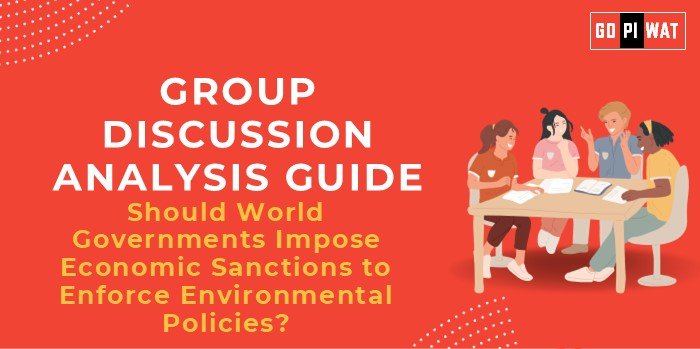📋 Group Discussion Analysis Guide
🌟 Should World Governments Impose Economic Sanctions to Enforce Environmental Policies?
🌐 Introduction to the Topic
Opening Context: Climate change has emerged as one of the most pressing global challenges, with consequences ranging from rising sea levels to extreme weather events. Economic sanctions as a tool to enforce environmental compliance present a controversial but potentially impactful strategy.
Topic Background: Economic sanctions are punitive measures, often in trade or financial restrictions, aimed at enforcing compliance with international standards. Their use in environmental policy has gained attention as global entities struggle to enforce agreements like the Paris Accord.
📊 Quick Facts and Key Statistics
- 🌍 Global Emissions: The top 10 emitters contribute over 70% of global emissions, highlighting targeted policy needs (UNEP, 2023).
- ⚖️ Environmental Sanctions Cases: The EU imposed fines on Brazil in 2023 for deforestation-linked exports.
- 📉 Economic Losses: Climate inaction could cost the global economy $178 trillion by 2070 (Deloitte).
- 🌎 Paris Agreement: 196 countries signed, but compliance remains inconsistent.
👥 Stakeholders and Their Roles
- 🏛️ National Governments: Enforce policies and negotiate sanctions.
- 🌐 Global Organizations: Institutions like the UN and WTO mediate and implement sanctions frameworks.
- 🏢 Private Sector: Innovate green technology and adapt supply chains.
- 👥 Citizens: Demand accountability and green practices.
🏆 Achievements and Challenges
- 🎯 Achievements:
- EU’s Carbon Border Adjustment Mechanism (CBAM) promotes green production globally.
- China’s reduction in coal dependence by 10% since 2018.
- US rejoining the Paris Accord boosted global momentum.
- ⚠️ Challenges:
- Resistance from developing nations due to economic dependency on high-emission industries.
- Potential retaliation or trade wars.
🌍 Global Comparisons
- 🌟 Successful Example: Norway’s strict compliance led to its green transformation.
- 🌲 Challenges: Brazil’s deforestation penalties highlight enforcement difficulties.
📋 Structured Arguments for Discussion
- ✔️ Supporting Stance: “Economic sanctions compel nations to adopt sustainable practices, as evidenced by the EU’s trade policies influencing global markets.”
- ❌ Opposing Stance: “Sanctions disproportionately harm developing nations, risking global inequality.”
- ⚖️ Balanced Perspective: “While sanctions drive accountability, equitable frameworks ensuring support for developing economies are essential.”
🛠️ Effective Discussion Approaches
- 🔍 Opening Approaches:
- Highlighting urgency: “Climate change is a global emergency requiring decisive action, including sanctions.”
- Case-based: “Brazil’s experience shows both potential and challenges of sanctions for environmental enforcement.”
- 💬 Counter-Argument Handling:
- Acknowledge economic disparity concerns; propose financial aid mechanisms.
- Suggest collaborative alternatives like technology-sharing.
📈 Strategic Analysis of Strengths and Weaknesses
- 🟢 Strengths:
- Drives compliance.
- Aligns with global goals.
- 🟡 Weaknesses:
- Risk of economic retaliation.
- Inequality in impact.
- 🔵 Opportunities:
- Promotes innovation in green technology.
- 🔴 Threats:
- Geopolitical tensions.
- Enforcement issues.
📚 Connecting with B-School Applications
- 🌏 Real-World Applications: Projects on green supply chain management or international trade strategies.
- 🤔 Sample Interview Questions:
- “How should sanctions be balanced to avoid harming vulnerable economies?”
- “What role can businesses play in achieving compliance with environmental sanctions?”
- 💡 Insights for Students:
- Explore sanctions’ impacts on sustainable business models and global trade.


